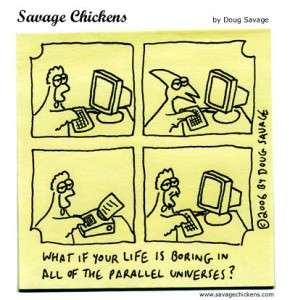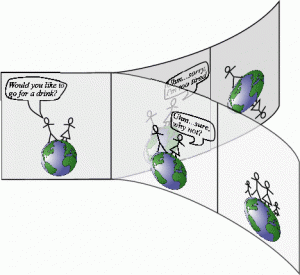There’s been much news, of late, concerning the planarian worm, which is effectively immortal. Unfortunately, this version of life everlasting offers little hope to us humans.
 But there’s a fix, one that doesn’t mean we have to begin reproducing asexually if we want to persist to the planarian extent. Of necessity, I’ll argue, we’re already, always and forever, living in our “afterlife.”
But there’s a fix, one that doesn’t mean we have to begin reproducing asexually if we want to persist to the planarian extent. Of necessity, I’ll argue, we’re already, always and forever, living in our “afterlife.”
Having our sex and living forever too
Here’s my theory, for whatever it’s worth, and in full knowledge that I may well have reinvented the bicycle yet again (and that these arguments will make Bill the Mathematician’s eyes bulge with indignation).
First I’ll ask you to read the following epigraph to a short story involving serial suicide leading to redemption I wrote many years ago and never got around to publishing. (What’s the hurry, eh? At least in light of the cosmological scheme about to unfold before Bill’s bulging eyes.)
One way to make sense of quantum theory is to view our universe as an infinite number of overlapping, superimposed realities which are split apart into separate, alternative worlds each time an observation is made, with the result that the universe is constantly splitting into innumerable near copies of itself. …
[O]ur own bodies are part of the world, and they too are split and split again. Not only our bodies, but our brains and, presumably, our consciousness is being repeatedly multiplied, each copy becoming a thinking, feeling human being inhabiting another universe much like the one we see around us. … This vast multiplicity of realities raises an intriguing question: why do we find ourselves living in this particular universe rather than one of the myriad of others? Is there anything special about this one, or is our presence here simply random?Paul Davies, Other Worlds: Space, Superspace and the Quantum Universe
Immortality for secularists
Let me introduce you to Joe Atheist, and let’s say circumstances conspire to kill him. He’s walking down the street one sunny afternoon and he’s flattened by a piano that drops from just outside a fourth-floor apartment.
In adjacent Universe A1, Joe quite likely dies a similar death at about the same time, circumstances in A1 being much the same here as they are in the first universe—and as they are in an infinite number of other adjacent worlds wherein Joe dies in this way.
As we move from the infinite number of Universe A1s to the infinite number of Universe A2s and then to the A3s and so on, things get more and more different. Joe A remains much the same person, and his consciousness is virtually identical across them, and events leading to his close encounter with the piano remain similar.
At some point(s), though, circumstances become different enough—perhaps metal fatigue in a bolt on the block and tackle doesn’t become critical till a second later, and the piano misses Joe by inches. Or Joe sleeps through his snooze alarm and takes a taxi instead of walking. And this Joe goes on enjoying life till he’s killed by a rogue cleanerbot 15 years later.
become critical till a second later, and the piano misses Joe by inches. Or Joe sleeps through his snooze alarm and takes a taxi instead of walking. And this Joe goes on enjoying life till he’s killed by a rogue cleanerbot 15 years later.
Generalizing from Joe’s experiences, maybe the conscious me that prevails, no matter what happens to any given instance, or probability, of me parallels the quantum particle that is really a superposition of every probability, of all potential positions and momentums, of every state it could be in, where one particular observation collapses it as this particle, with this position and momentum, determining one state of affairs as that one prevailing.
The “original” Joe Atheist is dead—in some sense, maybe to the extent that this universe, from Joe’s POV, is no more—as perhaps are Joes A1 through A1+n dead in a succession of adjacent universes. But Joe’s consciousness effectively persists in Joe A11 and in 11+n Joes who are aware only of a close call, and they thank their lucky stars.
In short, every time Joe, or you or me, is killed, a cognate consciousness persists in the next most adjacent universe(s) where circumstances are sufficiently different to avert that particular death. Your continuous sense of self persists in adjacent versions of your selves, always with “your” sense that there’s just one of you.
 Given that every event, every decision in the universe, causes that universe (whichever universe is currently “that” one) to branch, and so on and so on, successively adjacent worlds proliferating constantly without end, we can say that each and every one of us conscious beings is necessarily immortal. Every time one of our determinates snuffs it, our sense of self and consciousness segues seamlessly right into the next most feasible universe, and we’re never any the wiser regarding the no doubt infinite occasions of our demise, which are never really untimely, since we see now that death holds no real sting.
Given that every event, every decision in the universe, causes that universe (whichever universe is currently “that” one) to branch, and so on and so on, successively adjacent worlds proliferating constantly without end, we can say that each and every one of us conscious beings is necessarily immortal. Every time one of our determinates snuffs it, our sense of self and consciousness segues seamlessly right into the next most feasible universe, and we’re never any the wiser regarding the no doubt infinite occasions of our demise, which are never really untimely, since we see now that death holds no real sting.
The question arises, of course, how do we empirically test this fine hypothesis, potential solace to one and all, including skeptics of every ilk except for those who won’t buy the infinite-universe model we’re dealing with here? If we do buy it, then the only reasonably ethical test that springs to mind is suicide, just to see what happens. Indeed, scientific rigor would suggest a series of suicides.
The problem is that we have no evidence our consciousness has any awareness of its cognates in adjacent universes. So you will always be conscious of yourself in the here and now, not in your experience of the not here but instead there. And you can never actually die, no matter how hard you try to kill yourself, since in the manifold of constantly bifurcating universes circumstances will never conspire to have you succeed in killing yourself, at least from the POV of your consciousness. Okay?
So we’re left, I would argue, with no more than a logically persuasive theory of necessary and inevitable immortality. Empirical proofs will have to wait.
In summary, and referring back to the Paul Davies epigraph, above, it’s hard to see how we aren’t all immortal—that every time circumstances “kill” us, we don’t really die. Our sense of self persists in some adjacent universe, probably a bunch of them, where things are different enough we’re still pretty much who we were but in circumstances where we didn’t die. And even if that next version of us is killed right afterwards, we’re still conscious in the next manifold of adjacent worlds. And so on, with some version of “me,” related more or less closely by family resemblances, slipping and sliding, bobbing and weaving and always there, somewhere. Always alive. Never conscious of ever having actually died.
Like it or not, death is always circumvented by a persisting contiguous consciousness in some other universe(s).
In fact, each and every one of us is always alive at various different ages, maybe all of them, in all kinds of different circumstances, in an infinite number of universes. All at the same time. Where unfortunate happenstance extinguishes any one of these expressions of a personality, at any age, adjacent versions remain self-conscious yet unaware of this, though they may well go, “Whoa! That was a close call,” as the car that nearly hit them speeds away. Or the piano flattens the person right in front of them.
An infinity of other (potential) universes, meanwhile, has never included any version of who “you” are, and never will.
That much is plain. (And that loud pop-pop, just now, was Bill the Mathematicians eyeballs exploding with indignation.)
Heaven and hell for secularists
Corollary 1:
Live hard and live fast, for we are, each and every one of us, by nature bulletproof.
Corollary 2 (also a caveat regarding Corollary 1):
To the extent you can act in ways that make your current determinate self and the universe with which it is coupled a better one—i.e. in terms of the prospective conditions it would provide for a happy outcome in your determination in a next-most didn’t-die adjacent world, you should live “well,” i.e. in a moral and ethical manner. And–to the extent that makes it more likely your own next determination will try to act in a similar way–you thereby optimize the chances your person (consciousness, “self,” personality) will then manifest in worlds progressively more conducive to a good life. (And I reinvent the bicycle, again and again, without end. See Robert Thurman’s Infinite Life for a Buddhism-inspired take on immortality.)
Behaving badly, of course, will tend to have the converse effect.
And Bob’s yer uncle, eh? Not only have we provided a palatable concept of immortality for Joe Atheist, we’ve established secular grounds for a heaven and hell.
I’ll leave my arguments for the non-existence of Richard Dawkins for another occasion.
* A friend has sent me a link to “Quantum Suicide: How to Prove the Multiverse Exists, in the Most Violent Way Possible,”something I’ve read only after writing the foregoing. It presents a nice take on the suicide test we’ve proposed.
* A recent Boston Review essay considered a few thinkers and their various takes on the afterlife. Go ahead and read it, if you enjoy philosophers dancing on the heads of pins.
Savage Chickens cartoon used with permission.
The second multiple universe cartoon is from Max Tegmark’s website.

From Bill the Mathematician (via Skype):
“There’s also Tipler’s idea of immortality, in which computing becomes pervasive, and time dilates during the Big Crunch, meaning that all things that can be computed will be computed, meaning that we will all be resurrected virtually, and will enjoy infinite subjective life.”
It seems that the pop-pop did not signal the explosion of Bill’s eyeballs after all. Far from indignation, he has expressed sympathy with the arguments put forward in this post, at least as valid thought experiments.
From the Sage of Kathmandu (via e-mail):
“This is heady stuff, and I’ve had to read it several times, using
different pairs of glasses, and it requires another reading. I like
multiple universes, they give one an excuse for getting away with just
about everything. I will comment on it more…but I assume that you
have both referred to the website Atheists of Silicon Valley
(http://www.godlessgeeks.com/LINKS/Humor.html).
Multiple universes make me think of Nietzsche’s coronary, or rather
opposite: that our actions, our lives, the state of the universe, etc.
as we experience them now will be rerun at our death, we’ll live it
over and over again for eternity, and what are the ethical
implications? Any decision I make now, I’ve got to live with not only
in this life, but experience it again and again and again. So should I
have eaten all those pickles? That’s as far as I got with N, after
spending years trying to spell his name.”
Response:
The Nietzsche stuff is apposite, though I think he might have derived that from a Laplacean scheme of things, wherein cause-and-effect rools, OK! And in an infinity of space or time or both, the same essentially accidental conjunction of bits arrayed in just this (or any other) way will recur again an infinite number of times.
I appreciate the fact (claim?) that you read this stuff more than once. Perhaps I should suggest that the next pair of reading glasses you try should be Blues Brothers-type shades, and that you should be drinking pastis in full sun as you read while taking the occasional pull off a big spliff.
Damn. Maybe I should’ve included a user’s manual with the posting.